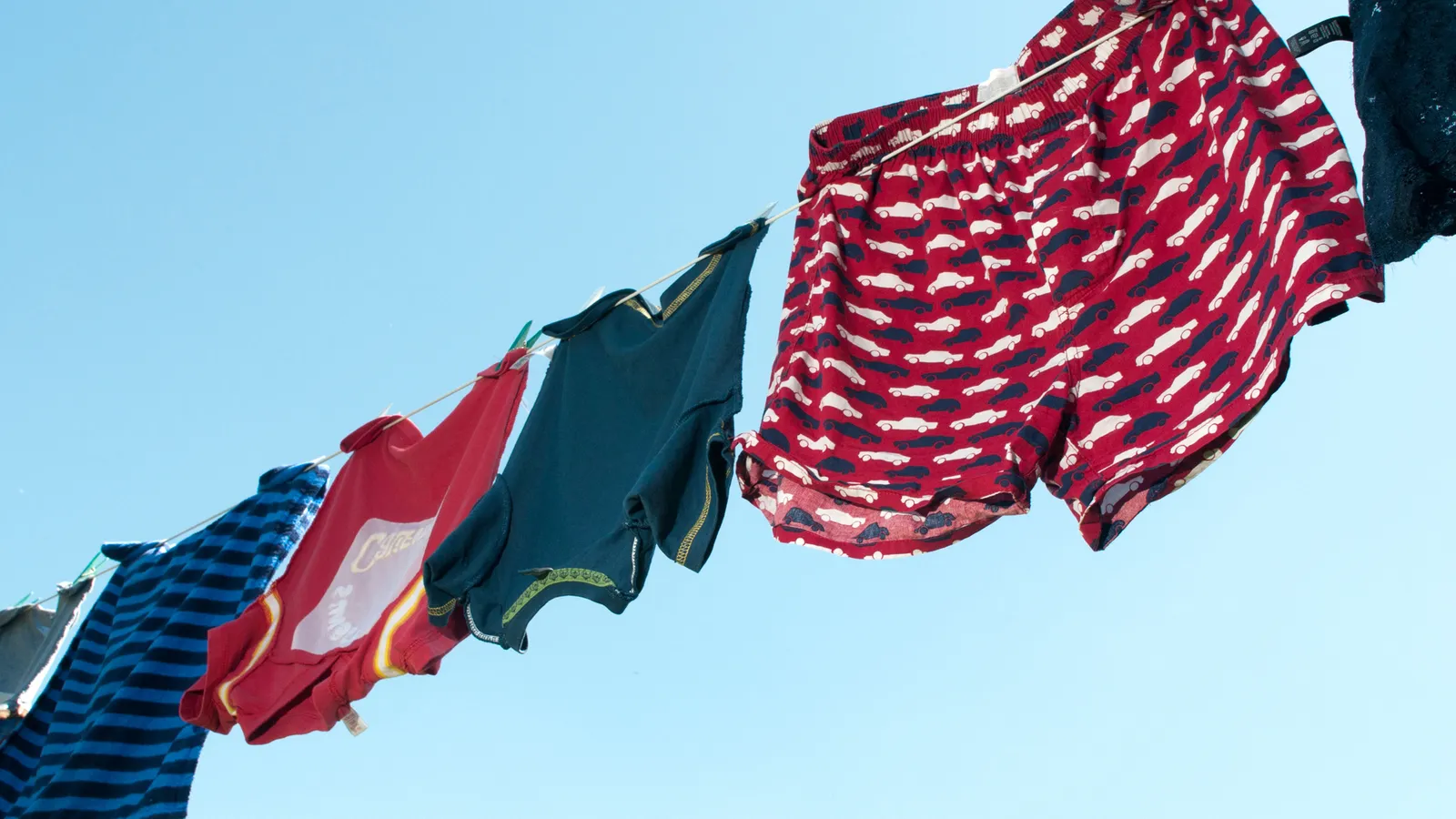The rise of the 'no-wash' movement
There's a growing cohort of people who believe in washing clothes less – or not at all. Matilda Welin talks to the 'no-wash' and 'low-wash' believers.

Bryan Szabo and his team have spent hours poring over photos of well-worn jeans, including vintage fades with swathes of bleached fabric and high-contrast fades with knee-pit patterns of honeycomb as well as whiskers around the crotch area. Online, the team praises the community's top faders. "This crotch repair is crazy good!" they exclaim. Or: "Subtle and even shades... A near-perfect balancing of... fade patterns with spectacular blue tones." This last one is the winner. For this is the judging of a competition; the Indigo Invitational, where people from across the world wear raw denim jeans for a year. But the competitors are not only the top jeans faders in the world. They are also champions of something else: The denim low-wash. Since denim becomes softer when it’s soapy and wet, one of the keys to achieving high-contrast patterns is to avoid washing them. The strategy is followed by everyone from the members of a no-wash club to the CEO of Levi's.
For Szabo, the low-wash habit began when he bought his first pair of raw denim jeans in 2010. Travelling from his native Canada to Europe, he brought his jeans for the six-month trip. "It was a quirk about me that I had these stinky jeans," he tells BBC Culture. "They smelled awful." In Budapest he met his future wife, and the jeans became a character in their relationship. "My jeans would be in, like, a pile on the floor at the end of the bed," he remembers. "You walked into the room, you could smell [them]... I was very fortunate that my wife was as interested in me as she was."
Among the competitors in the Indigo Invitational, which starts its fourth year next January, more than nine out of 10 participants delay the first wash of their trousers until they have been worn 150 or 200 times, Szabo estimates. "Some of these pairs, as it's coming up on the end of the year, I wouldn't want to handle up close," he says. "They would probably smell wrong." A few of his raw denim friends go even further, abiding by what he calls a "never-wash philosophy". "[For one of them], in very tight spaces like a small elevator or something like that, if the dude is wearing certain pairs you can smell it a little bit," he says. "Some of his best faded examples are also displayed in jeans trade shows. [They have] an aroma... It's not an unpleasant smell, per se, but it's a smell."
Instead of turning to the washing machine, raw denim wearers learn other ways to care for their garments, like exposing them to UV rays ("I call it the sun bath," Szabo says) or just airing them overnight. Szabo himself uses the washing machine, too. "As soon as [my wife] can smell my jeans, she tells me, and they immediately go in the washroom."
Designer Stella McCartney caused headlines by detailing her low-clothes-cleaning habits
Jeans wearers are not the only people cutting down on laundry. In 2019, designer Stella McCartney caused headlines by detailing her low-clothes-cleaning habits, telling the Guardian: "Basically, in life, rule of thumb: if you don't absolutely have to clean anything, don't clean it. I wouldn't change my bra every day and I don't just chuck stuff into a washing machine because it's been worn. I am incredibly hygienic myself, but I'm not a fan of dry cleaning or any cleaning, really."
Others re-think their washing habits due to concerns for the environment or rising electricity costs. (As for the denim bros, Szabo says most are driven by aesthetical concerns that are "accidentally sustainable".) Mac Bishop, founder of clothes company Wool & Prince, explains to Fast Company that he changed his focus on "convenience and minimalism", which resonated well with male consumers – "particularly those who already disliked doing laundry" – when he started promoting his women's brand, Wool&. Subjected to centuries of sexist laundry advertising, women would be less responsive to the idea of not washing their clothes, he theorised, and research backed him up, showing that, with women, environmentalism was a more effective reason to give.
Today, the Wool& brand sells merino wool dresses with the help of a "challenge" where customers wear the same dress every day for 100 days. A common takeaway from challenge-takers is "the decreased laundry that comes along with wearing merino daily", according to Rebecca Eby from Wool&.
One of Wool&'s customers is Chelsea Harry from Connecticut, US. "I grew up in a house where you wash everything after one use," she tells BBC Culture. "Towel after one use, your pyjamas after one use." One summer, Harry lived with her grandmother, who taught her to put her pyjamas under her pillow in the morning and wear them again the next night. Later, she met her husband, who, she says, "hardly ever washes any clothes". Then, during the pandemic, Harry started hiking. This is when things really changed. "Obviously you can't shower after you've been hiking all day and you're sleeping in a hammock or tent," she says. Others in the hiking community recommended Ex Officio underwear, which can be worn over subsequent days or washed and dried quickly. Using this and other wool clothing, Harry discovered she could hike and backpack for days and still feel comfortable. "Then," she says, "I started to think: Why don't I do this in my everyday life?" And that was that.
Scents and sensibility
Harry is not worried about smell. "I trust my nose," she says. Wearing a new dress with a different wool blend, she can smell herself – something that never happens in her other dresses, she explains, even when she travels to tropical locations like the Middle East in summer. Like Szabo, she employs tricks to avoid a full wash: Airing the garment overnight, or spraying vinegar or vodka in the armpits. "I absolutely love just, at the end of the day, hanging out my wool dress, my wool leggings, my wool socks," she says. "That's what I do. I hang them up by the window, I take a shower, I have my Ex Officio underwear, and in the morning, I just put it all back on."
We don't want people to think that they can't wash stuff because they're destroying the planet – it's about trying to get the balance right – Mark Sumner
"One of the worst things that you can do to a garment, in terms of its durability, is wash it." So says Mark Sumner, a lecturer in sustainable fashion at the University of Leeds. During a wash, he says, garments can tear, shrink and lose colour. With his colleague Mark Taylor, Sumner studies how microfibres from household laundry end up in marine animals. But while he says reducing the frequency of our clothes washing is the right choice for the environment, he doesn't advocate a complete washing machine moratorium.
"We don't want people to think that they can't wash stuff because... they're destroying the planet," Sumner tells BBC Culture. "It's about trying to get the balance right." Washing clothes is important for medical and hygiene reasons, he says, for example for people suffering from eczema who are trying to avoid irritation caused when our natural skin bacteria multiply inside our clothing. It's also important for people's self-esteem "to not feel embarrassed about their clothes because they're dirty or smelly".
If you were planning to look to others to determine how often you should load up the washing machine, then think again. When it comes to laundry habits, say Sumner and Taylor, there are no averages: We all use different wash temperatures, wash cycles and combinations of colours and fabrics. And the scientists themselves face the same conundrums as the rest of us. "I've been involved in textiles for 30 years now, I think," says Sumner. "And I should know that I should be separating my cottons from synthetics, and my whites from my colours... But frankly, I haven't got time."
The best approach, it seems, is to be flexible. "If your clothes don't smell, then don't bother [washing them]," advises Sumner. "And when you're going to wash them, be clear about what to do to get the garment clean, but in the most effective way." Wash things on lower temperatures, he suggests, or do a really short refresh cycle without any washing powder at all.
Besides – washing your clothes too often eats up hours of your life. Who has the time? "I'm really interested in sustainability and the environment and natural resource management," says Harry. "But I'm also concerned with my time." Szabo is concerned with sustainability, too, but also has other reasons for opting out of overzealous cleaning habits. "I've got other things to do," he says. "I've got a dog to walk."
-bbc







